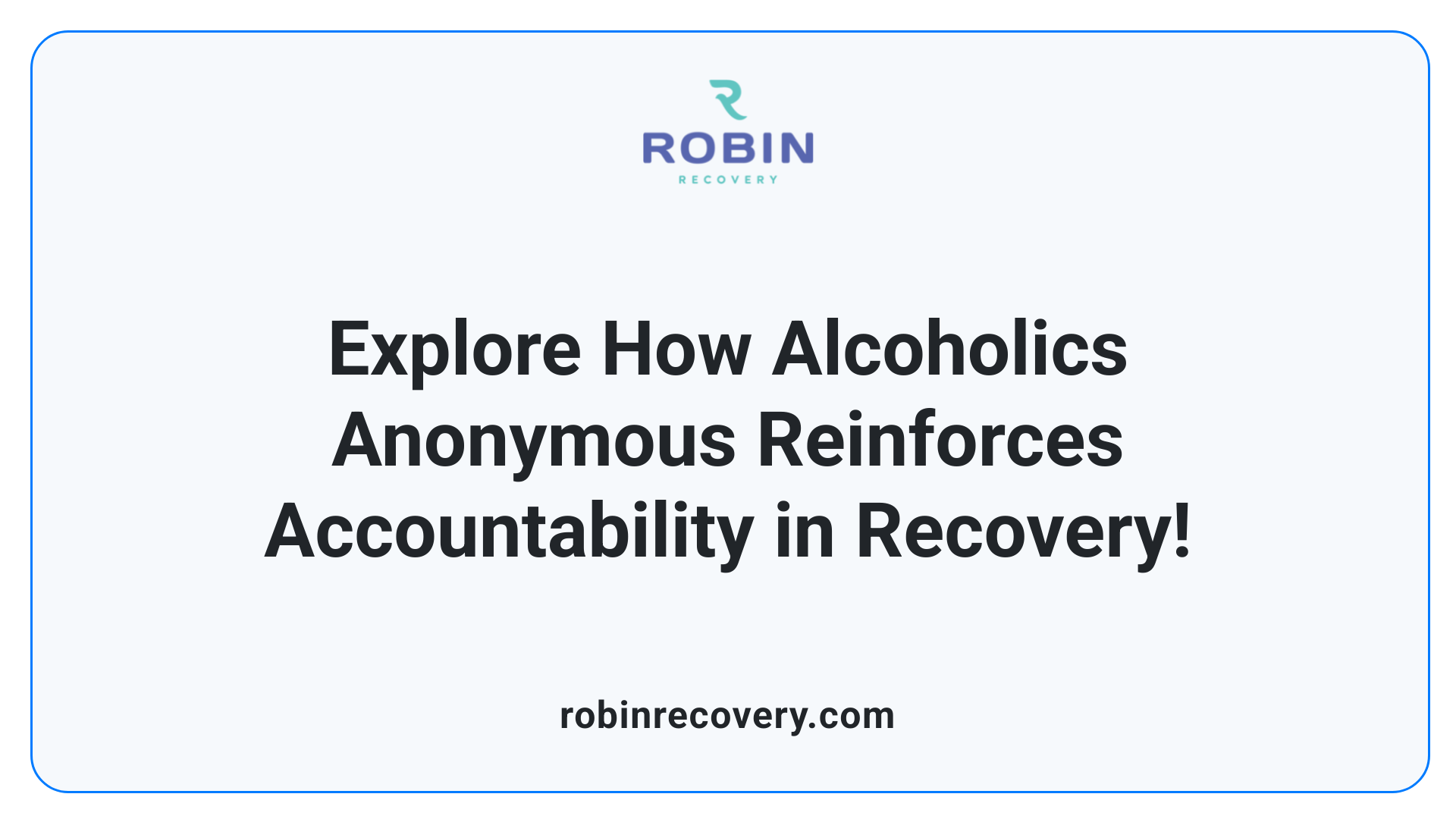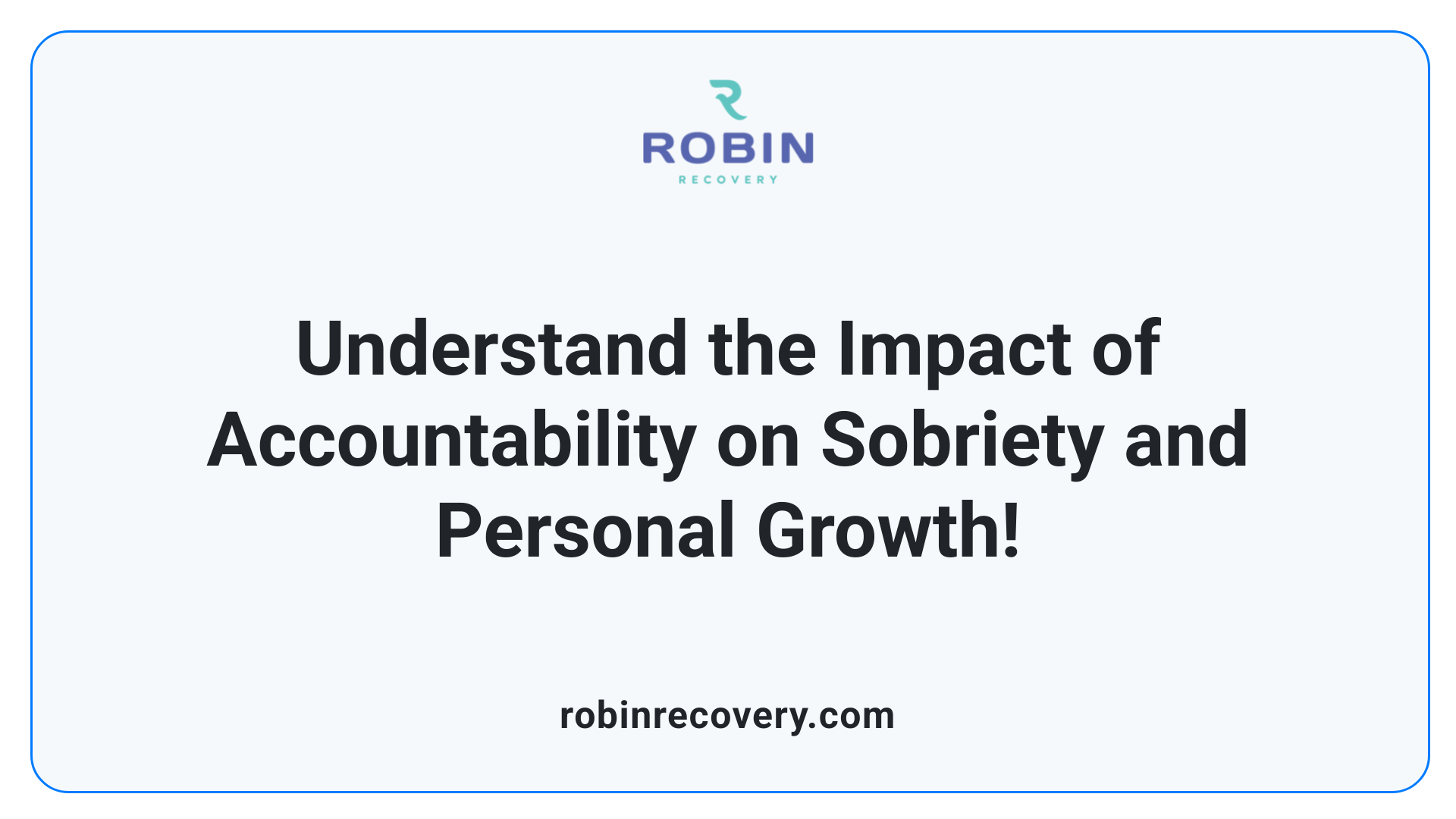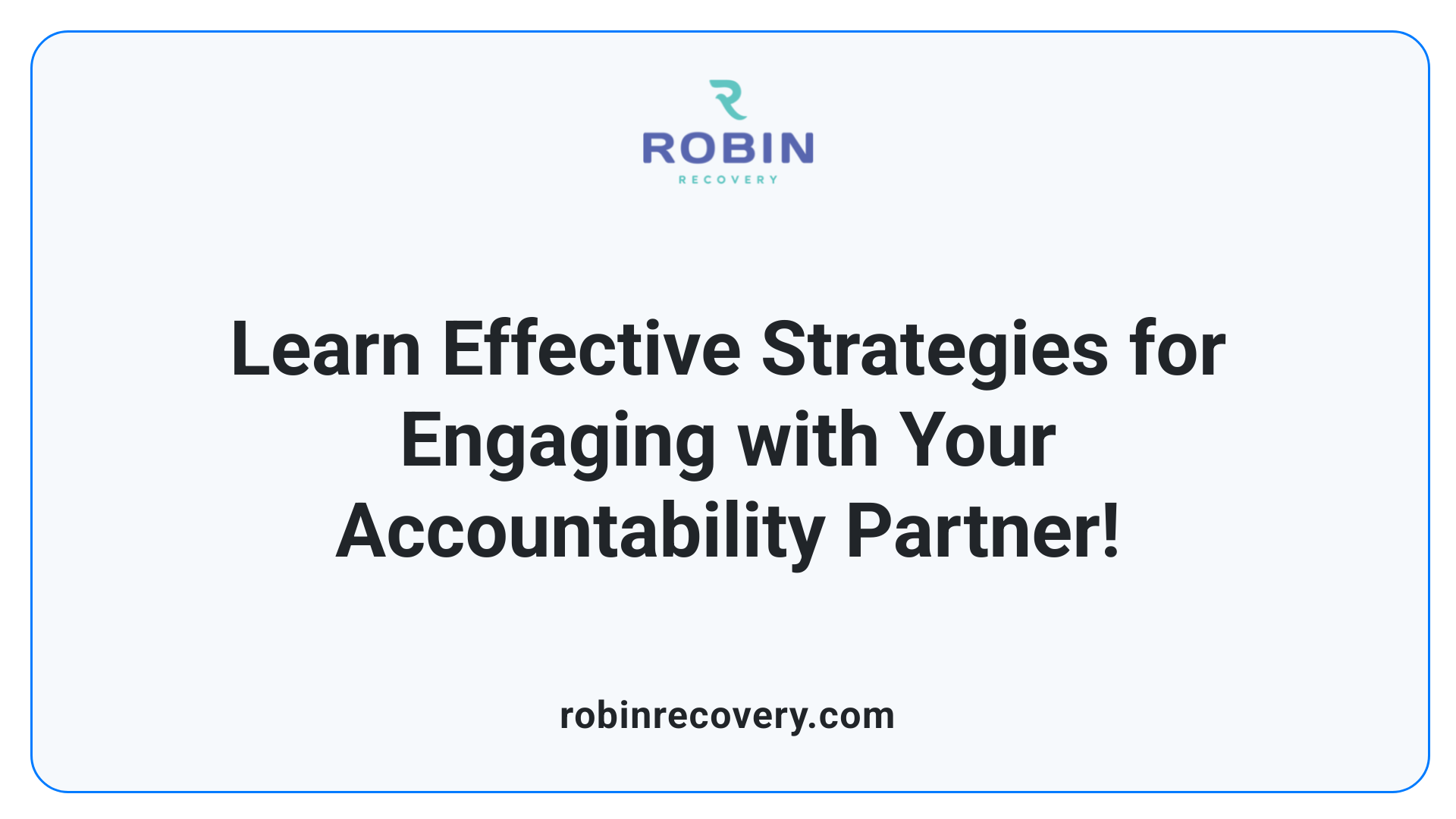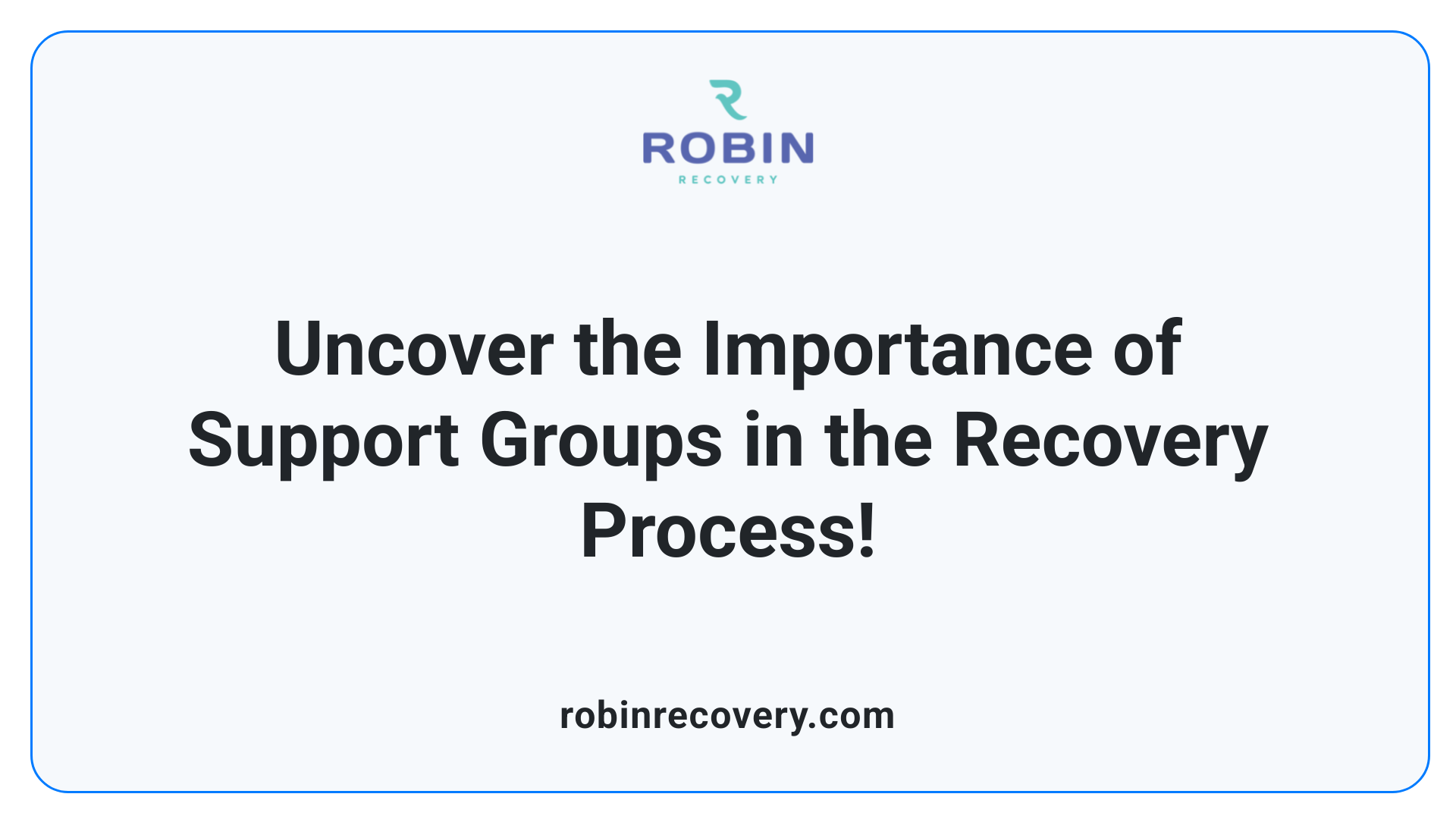The Role of Accountability Partners in Recovery

Understanding Accountability
Accountability in addiction recovery is more than just a support mechanism; it's a fundamental pillar that can drastically increase the likelihood of successful sobriety. Serving as an anchor, accountability partners play a pivotal role in guiding individuals through the complex journey of breaking free from addiction. This article delves into how these relationships foster personal growth, sustain sobriety, and create pathways for healing.
Accountability Partners in Addiction Recovery

What role do accountability partners play in addiction recovery?
Accountability partners play a crucial role in addiction recovery by providing essential support and encouraging individuals to maintain their commitment to sobriety. They help maintain personal accountability by facilitating regular check-ins, fostering transparency, and aiding in the setting of realistic, measurable goals. This relationship can significantly reduce the risk of relapse, as accountability partners create a safe space for open dialogue about struggles and achievements.
Support in maintaining sobriety
Having a reliable accountability partner can increase the chance of success in addiction recovery by an impressive 95%. These partners offer emotional support, help manage cravings, and remind individuals of their reasons for choosing sobriety. They also counter isolation by providing companionship during difficult times, creating an environment where individuals feel understood and supported.
Importance of honesty
Honesty is the foundation of effective accountability. Partners encourage honesty about both struggles and successes, leading to self-awareness and better decision-making. Writing a personal accountability statement can aid individuals in recognizing the consequences of their actions and reinforce their commitment to sobriety. In essence, the accountability partnership fosters transparency, making it easier for individuals to confront and manage their addiction journey.
The Role of Alcoholics Anonymous

What does Alcoholics Anonymous say about accountability?
Alcoholics Anonymous (A.A.) emphasizes accountability as a fundamental aspect of the recovery process. The First Step involves acknowledging one's powerlessness over alcohol, an essential realization that paves the way for individuals to assess their unmanageable lives and seek assistance.
This admission is crucial as it fosters a supportive community. Members are encouraged to hold each other accountable throughout their recovery journeys. In A.A., the concept of accountability is deeply intertwined with the fellowship's ethos; recovery cannot be navigated in isolation. This interdependence provides a network where individuals motivate one another to stay committed to their sobriety.
Community support benefits
The collective strength of A.A. members reinforces the idea that accountability is shared. Participants in the program not only receive emotional support but also actively engage in mutual responsibility. The environment cultivates a sense of belonging, significantly enhancing recovery outcomes.
This communal approach heightens the commitment to sobriety, allowing individuals to celebrate progress and address challenges openly. Ultimately, A.A. provides a safe space where accountability flourishes, turning the recovery process into a journey marked by shared experiences and collective resilience.
Accountability's Contribution to Sobriety and Growth

How does accountability contribute to maintaining sobriety and personal growth?
Accountability plays a crucial role in maintaining sobriety and fostering personal growth by instilling a sense of responsibility for one's actions and decisions. It encourages individuals to be honest about their feelings and behaviors, which helps in recognizing past mistakes and mending relationships affected by addiction.
By taking ownership of their recovery journey, individuals shift from a victim mentality to an empowered mindset, allowing them to create positive changes in their lives.
Prevention of relapse through accountability
The presence of accountability partners significantly aids in preventing relapse by offering support during challenging moments. These partners help individuals stay focused on their recovery goals and remind them of their strengths and past achievements.
Structured frameworks like support groups promote a culture of accountability where members can share experiences and offer encouragement, making it easier to confront triggers that threaten sobriety.
Moreover, maintaining regular check-ins with one's support system can foster ongoing commitment to sobriety, ensuring that individuals do not face their challenges alone. In sum, accountability not only helps sustain recovery but also encourages continuous self-reflection, emotional management, and a proactive approach to personal growth.
Practical Engagement with Accountability Partners

What are practical strategies for engaging with an accountability partner?
Practical strategies for engaging with an accountability partner focus on establishing a supportive and productive relationship. One effective approach is to set clear and realistic goals. Both partners should agree upon these goals, fostering a shared sense of responsibility for progress.
Maintaining open communication is essential. Partners should candidly discuss triggers, progress, and any urges they might be experiencing. This transparency facilitates honesty, reinforcing the very foundation of accountability.
Another useful strategy is to schedule regular check-ins. These consistent assessments allow both partners to evaluate their progress, address challenges, and adjust plans as necessary to stay on track.
Using specific tools can also enhance accountability. For example, the Accountability Worksheet encourages reflection on behaviors, helping individuals identify patterns that may need addressing. This tool can serve as a tangible component of the accountability partnership, making the process more structured.
Lastly, choosing an accountability partner who understands the complexities of the recovery journey and offers empathetic support can significantly boost the effectiveness of the relationship.
Tools and practices to enhance accountability
Integrating various tools and practices can further strengthen accountability in recovery.
Tool/PracticeDescriptionBenefits Accountability Worksheet A reflective tool for tracking behaviors and identifying patterns Enhances self-awareness Sobriety Tracking Apps Digital tools to monitor sobriety and share progress with partners Improves engagement and transparency Scheduled Check-Ins Set times for partners to discuss progress and challenges Maintains consistency in support Support Groups Regular meetings with peers for shared accountability Builds community and mutual encouragement Journaling Writing about experiences and challenges in recovery Encourages self-reflection
Incorporating these strategies and tools into the recovery journey fosters a robust support system that is essential for maintaining accountability and enhancing long-term sobriety.
Fostering Accountability in Recovery
How can one foster effective accountability in recovery?
Fostering effective accountability in recovery involves a multi-faceted approach that emphasizes personal responsibility and supportive structures. Here are some strategies:
- Setting Clear Goals: Establishing specific, measurable, achievable, relevant, and time-bound (SMART) goals can provide direction. This clarity helps individuals focus on their recovery milestones and stay committed to their progress.
- Engagement with Support Networks: Working with an accountability partner or participating in support groups, such as Alcoholics Anonymous, creates a structured environment. These connections serve to motivate individuals and provide opportunities for sharing experiences and challenges.
- Utilizing Monitoring Tools: Assistive technologies, like sobriety apps, enable individuals to track their recovery progress. They can share updates with their accountability partners, reinforcing their commitment.
- Regular Self-Reflection: Engaging in consistent self-reflection allows individuals to critically assess their behaviors and recognize personal triggers. This awareness is vital for maintaining honesty and adapting strategies to prevent relapse.
- Crisis Management Planning: Developing a plan for potential relapses helps mitigate risks associated with setbacks. Having coping strategies in place empowers individuals to respond effectively during challenging times.
By cultivating a supportive accountability framework, individuals can enhance their recovery journeys, channeling their focus toward personal growth and healing.
Support Groups and Their Influence

Why are support groups important in recovery?
Support groups are vital in recovery as they provide a unique space for individuals to connect, share their journeys, and build a strong sense of community. This environment is essential for overcoming addiction. Participation in these groups, such as Alcoholics Anonymous (AA), is linked to a significant reduction in relapse risk—by approximately 35%.
Research indicates that peer support facilitates individuals in achieving and maintaining sobriety, leading to improved recovery outcomes. Not only do these groups offer emotional reinforcement, but they also help reduce feelings of isolation often experienced during recovery.
Impact on relapse prevention
The effects of support groups extend beyond just emotional comfort. These communities foster social connections that teach valuable coping skills to manage triggers and cravings. By sharing experiences, members learn from one another, enhancing their resilience against relapse. The regular engagement and accountability fostered within these groups empower individuals to admit their struggles and setbacks while celebrating their achievements, thus boosting motivation.
Furthermore, mutual support groups are linked to improved mental health outcomes, helping to alleviate symptoms of depression and anxiety. This holistic approach to recovery—addressing both addiction and mental health—positions support groups as a cornerstone of successful recovery strategies.
Support Group Features Benefits Impact on Recovery Peer Support Connection and Community Reduces feelings of isolation Shared Experiences Learning Coping Strategies Better trigger management Emotional Reinforcement Motivation and Accountability Decreased relapse risk Structured Environment Regular check-ins Improved mental health, less anxiety Achievement Celebrations Reinforcement of progress Enhanced commitment to sobriety
In summary, the role of support groups is indispensable in the recovery journey, underscoring their importance in fostering accountability and sustained sobriety.
The Broader Benefits of Accountability Systems
Integration in Recovery Plans
Accountability systems serve as a fundamental component in the structure of recovery plans. By integrating regular check-ins and support from accountability partners, individuals can remain focused on their goals. These systems facilitate a consistent framework that encourages open communication, vital for sharing struggles, progress, and triggers.
A well-rounded recovery plan often includes:
- Setting clear goals: Establishing what one aims to achieve in recovery.
- Tracking progress: Keeping a record of sobriety milestones and personal achievements.
- Open communication: Regular conversations with accountability partners to discuss challenges and successes.
Enhancing Self-Awareness and Coping Skills
Being part of an accountability system significantly enhances self-awareness. The feedback from partners encourages individuals to reflect on their behaviors and decisions in recovery.
Coping skills are also improved through these systems. For example:
- Identifying triggers: Individuals learn to recognize situations that may lead to relapse, allowing for proactive management.
- Developing strategies: Partners help brainstorm effective ways to handle cravings or stressors.
Additionally, the emotional support provided helps reduce feelings of isolation, reinforcing a sense of community essential for successful recovery.
The Power of Accountability in Recovery
Embracing accountability in recovery is transformative, empowering individuals to take control of their lives and fostering a strong support network that aids both sobriety and personal growth. Whether through one-on-one relationships with accountability partners, involvement in support groups, or engaging with larger recovery communities, the role of accountability is indisputable. As those recovering from addiction embrace honesty, responsibility, and community support, they establish a firm foundation for lasting change and a healthier future. Accountability not only amplifies the success of recovery efforts but enriches life far beyond the confines of addiction, cultivating resilience and growth.
References
- Accountability in Recovery: What You Should Know - Golden Gate
- Accountability in Recovery | 7 Ways to Engage Personal Accountability
- Accountability Partner Benefits: Addiction Recovery | Region Five
- Addictions: Choosing an Accountability Partner - Focus on the Family
- Importance of Accountability in Addiction Recovery
- Social Support and Accountability in a Consumer-Run Mental ...
- The Role of Honesty and Accountability In Addiction Recovery
